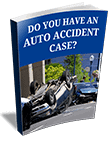If You Have Been in an Auto Accident, How Do You Know If You Have a Personal Injury Case?
Interviewer: Is there a typical scenario in a car accident that will result in a good case, one where someone should be getting compensation? What are the elements that make a viable case?
Stephen: Well, we have driving safety rules that are put in place that are intended to protect us and our families on the roadways. You know you have to maintain a safe distance between your car the vehicle in front of you. You know you have to obey traffic control signals. You have to yield to right-of-way when it’s your turn to yield the right-of-way.
Did the Other Driver Violate the Established Driving Safety Rules?
These driving safety rules are essential to keeping families safe on the roadways. A case starts when someone violates the driving safety rules. That’s where a liability arises and then whether it’s a case or not depends on whether someone has suffered damages, someone’s been damaged by a violation of the driving safety rules.
Does the Case Contain Liability and the Potential for Damages?
We look at liability number one and if liability’s there then we look at damages or if our client was injured. The amount of bodily damage to a vehicle is something that we look at but it’s not necessarily determinative.
For example, if a healthy twenty year old college football player gets rear-ended and there’s some damage to his car and no damage to the car that rear-ended him, we’re probably not taking that case.
If a seventy year old lady is rear-ended and there’s not much damage to her car, but she had pre-existing conditions or osteoporosis and she was more fragile, more susceptible, then we’ll take that case.
Elderly Victims in Auto Accidents: Texas Enforces the Eggshell Plaintiff Rule
Texas does follow what’s called the Eggshell Plaintiff rule, meaning that if someone is fragile and you hurt them, you’re still responsible for the entire amount of damage that you’ve done, despite the fact that they were fragile to begin with.
Is Your Auto worth Less after an Accident: Diminished Value Claims
That’s part of it. We don’t handle property damage claims alone. We only handle injury cases, but what we do handle is something called diminished value claims. The reason why we advertise for diminished value claims is we’re really looking for personal injury cases.
If someone’s involved in a car accident and there’s been enough damage to their vehicle, then even if the vehicle has been fully repaired then it’s worth less than previously just for the fact that it has been in an accident. That’s called diminished value and the factors that you look at are: how much damage was done; if there was any frame damage done, how old the car is and the value of the car.
I hire experts, they’re diminished value appraisers that come in on the appropriate case and evaluate the diminished value. I handle those.
Interviewer: That’s a situation where a car gets damaged and repaired but the value’s still diminished?
Stephen: If a car is totaled, then you get paid the fair market value of the car and that’s over. If the car is repaired then you now have a repaired vehicle that’s been damaged, and even though it’s been fully repaired it’s still worth less money than it was before the crash happened. That’s called diminished value.
An Experienced Personal Injury Firm Will Have Developed Beneficial Working Relationships with Physicians in all Specialties
A benefit with my firm is that I’ve been practicing here in Houston since 1997. I have a network of very high quality physicians, everything from orthopedics to neurosurgeons, physical therapists, any type of specialty doctor. I’ve created a network of doctors that I’ve worked with for all these years. They know that they can trust me from their experience with me, so they’re willing to work with me on cases and defer collection of their medical bills until the case is resolved. They do that despite the fact that most doctors won’t work with lawyers on that basis
Interviewer: What are they afraid is going to happen? Why wouldn’t they do that?
Stephen: They’re afraid that the lawyer’s going to not pay them at the end. Or, either not pay them or lowball them. You’re not necessarily going to sue over a small medical bill. They don’t know that that lawyer properly screens his cases. If a doctor is willing to treat someone and wait to get paid until the end of the case, he wants to make sure that, he knows about the injuries, he doesn’t know about the liability. He has to trust that the lawyer properly screened the case and only took a case that liability is reasonably clear.
Interviewer: Let’s say there could be injuries, but if the lawyer doesn’t handle the case properly, so there may be no settlement and no money to pay the doctor?
Stephen: Exactly. You’ve got to trust the lawyer that he’s going to pay you, but you also got to trust the lawyer that he took a good case and can properly represent the client on that case so that there is money there at the end of the day.
That only comes with experience and working with people and earning trust.

